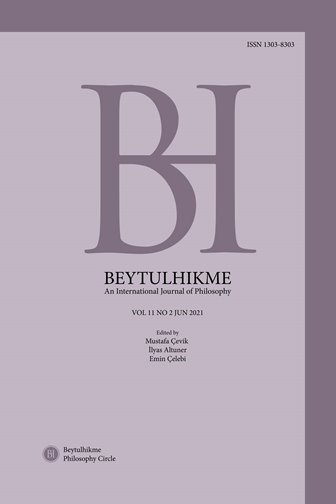Author :
Abstract
Sinirbilime göre, manevi olanları da dâhil, insani deneyimlerin tamamı beyin ve beynin biyokimyasal süreçlerinin bir ürünü olarak düşünülür. İnsani deneyimin bir türü olarak değerlendirebileceğimiz dini deneyimin sinirbilimin verileri ışığında ele alınması, nöroteolojik yaklaşımların temelini oluşturur. Bu makalenin konusu, dini deneyimleri sinirbilimin verileri merkezinde ele almaya çalışan nöroteolojik yaklaşımların avantaj ve dezavantajlarıdır. Nöroteolojik yaklaşımların avantaj ve dezavantajlarını belirlemek için önce beynin neliği; bilinç ve zihin kavramlarıyla olan ilişkisi bağlamında değerlendirilmeye çalışılacaktır. Daha sonra gündelik deneyimlerimizle dini ve mistik deneyimlerimiz arasındaki benzerlik ve farklılıklara temas edilmeye çalışılacaktır. Beyin, zihin ve bilinç kavramlarından hareketle bu kavramların, dini deneyim türleriyle ilişkisinden yola çıkılarak nöroteolojik yaklaşımın, dini deneyimleri ele almada avantaj ve dezavantajları ortaya konulmaya çalışılacaktır.
Keywords
Abstract
According to neuroscience, all human experiences, including spiritual ones, are considered as a product of the brain, and the brain's biochemical processes. Viewing religious experience, which we can regard as a kind of human experience, in the light of neuroscientific data, forms the basis of neurotheological approaches. The subject matter of this article is to investigate the advantages and disadvantages of the neurotheological approaches that attempt to place religious experience at the center of neuroscientific data. In order to determine the advantages and disadvantages of neurotheological approaches, first of all, what the brain. It will be evaluated in the context of its relationship with the concepts of consciousness and mind. In order to determine the advantages and disadvantages of neurotheological approaches, first, the nature of the brain will be evaluated in the context of its relationship with the concepts of consciousness and mind. Second, we will go on to discuss the similarities and differences between our daily experiences and our religious and mystical experiences. In sum, the overall aim of the present paper is to show the advantages and disadvantages of the neurotheological approach to religious experience by investigating the nature of the relationship between the kinds of religious experiences and the concepts such as brain, mind, and consciousness.
Keywords
- Ashbrook, J. B. (1984). Neurotheology: The Working Brain and the Work of The- ology. Zygon: Journal of Religion and Science, 19 (3), 331-350.
- Ashbrook, J. B. (1997). “Mind” as Humanizing the Brain: Toward a Neurotheology of Meaning. Zygon: Journal of Religion and Science, 32 (3), 301-320.
- Chalmers, D. (2007). The Hard Problem of Consciousness. The Blackwell Compa- nion to Consciousness. (Eds. M. Velmans & S. Schneider). New York: Blackwell Publishing, 225-235.
- Cunningham, P. F. (2011). Are Religious Experiences Really Localized within the Brain? The Promise, Challenges, and Prospects of Neurotheology. The Journal of Mind and Behavior, 32 (3), 223-249.
- Doehring, C. (2010). Minding the Gap When Cognitive Neuroscience is a Cognate Discipline in Pastoral Theology: Lessons From Neurotheology. Journal of Pastoral Theology, 20 (2), 93-108.
- Doko, E. (2018). Çağdaş Nörobilim ve Dini Tecrübe: Nöroteolojik Tezler Bir Zi- hinsel Durum Olan Tanrı İnancını Yanlışlayabilir mi? MetaZihin, 1 (1), 211-226.
- Manoussakis, J. P. (2016). God in the Mind? Religious Phenomena and the Teleo- logy of Consciousness. Revista Portuguesa de Filosofía, 72 (1), 147-168.
- Newberg, A. B. (2010). Principles of Neurotheology. Burlington, VT: Ashgate Publis- hing.
- Newberg, A. B. (2018). Neurotheology: How Science Can Enlighten Us About Spirituality. New York: Columbia University Press.
- Peters, K. E. (2001). Neurotheology and Evolutionary Theology: Reflections on the Mystical Mind. Zygon: Journal of Religion and Science, 36 (3), 493-500.
- Searle, J. R. (1991). Intentionality: An Essay in the Philosophy of Mind. Cambridge: Cambridge University Press.
- Searle, J. R. (1996). Akıllar, Beyinler ve Bilim. (Çev. K. Bek). İstanbul: Say Yayınları.
- Searle, J. R. (2004). Zihnin Yeniden Keşfi. (Çev. M. Macit). İstanbul: Litera Yayıncı- lık.
- Searle, J. R. (2005). Bilinç ve Dil. (Çev. M. Macit & F. Özpilavcı). İstanbul: Litera Yayıncılık.
- Searle, J. R. (2019). Özgürlük ve Nörobiyoloji. (Çev. Z. Özcan). Bursa: Sentez Yayın- cılık.
- Topbaş, E. (2013). Dindar Beyin: İnsanın Nöroteolojik Boyutu. Ankara: Panama Yayın-
- Vliegenthart, D. (2011). Can Neurotheology Explain Religion? Archive for the Psyc- hology of Religion, 33 (2), 137-171. Öz: Sinirbilime göre, manevi olanları da dâhil, insani deneyimlerin tamamı beyin ve beynin biyokimyasal süreçlerinin bir ürünü olarak düşünülür. İnsani deneyimin bir türü olarak değerlendirebileceğimiz dini deneyimin sinirbilimin verileri ışığında ele alınması, nöroteolojik yaklaşımların temelini oluşturur. Bu makalenin konusu, dini deneyimleri sinirbilimin verileri merkezinde ele almaya çalışan nöroteolojik yaklaşımların avantaj ve dezavantajlarıdır. Nöroteolojik yaklaşımların avantaj ve dezavantajlarını belirlemek için önce beynin neliği; bilinç ve zihin kavramlarıyla olan ilişkisi bağlamında değerlendirilmeye çalışılacaktır. Daha sonra gündelik deneyimlerimizle dini ve mistik deneyimlerimiz arasındaki benzerlik ve farklılıklara temas edilmeye çalışılacaktır. Beyin, zihin ve bilinç kavramlarından hareketle bu kavramların, dini deneyim türleriyle ilişkisinden yola çıkılarak nöroteolojik yaklaşımın, dini deneyimleri ele almada avantaj ve dezavantajları ortaya konulmaya çalışılacaktır. Anahtar Kelimeler: Teoloji, nöroteoloji, zihin, bilinç, dini deneyim.
